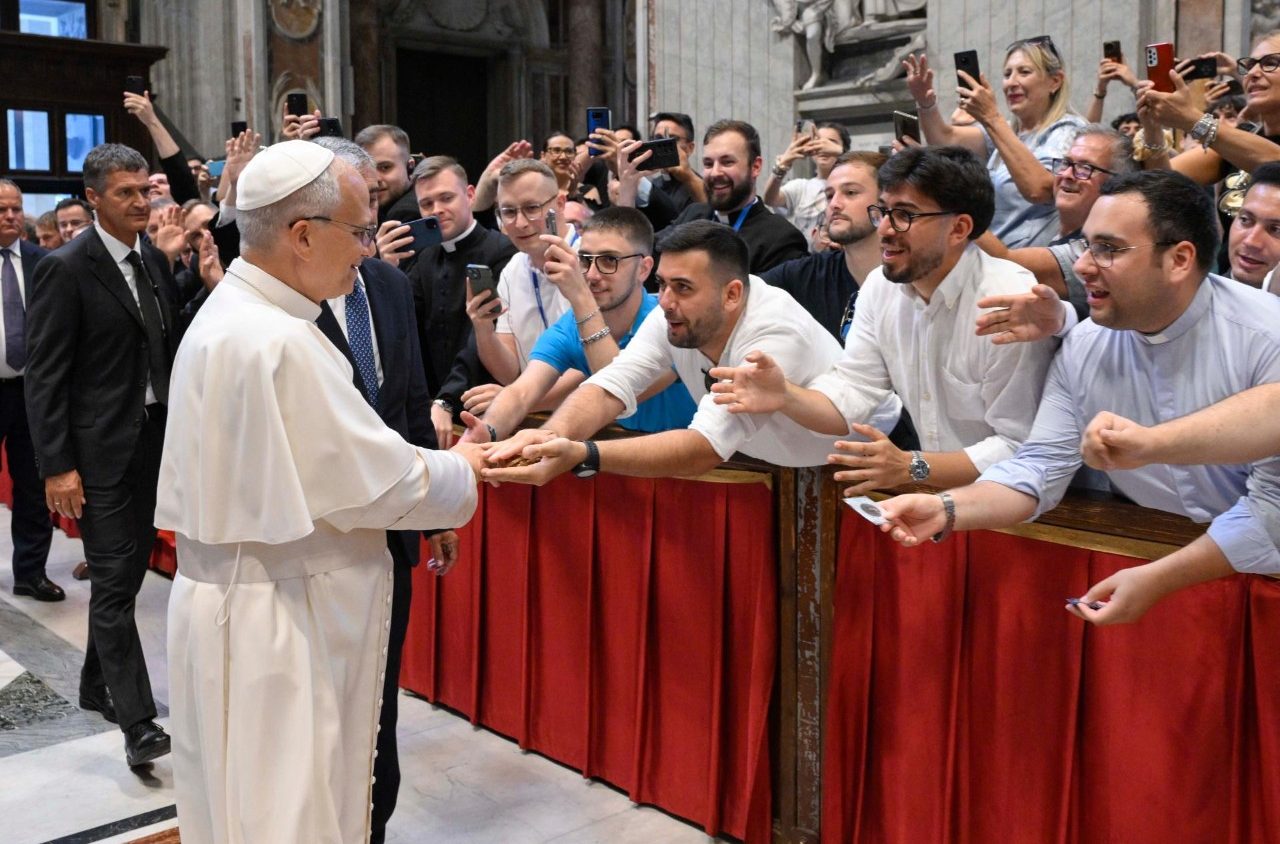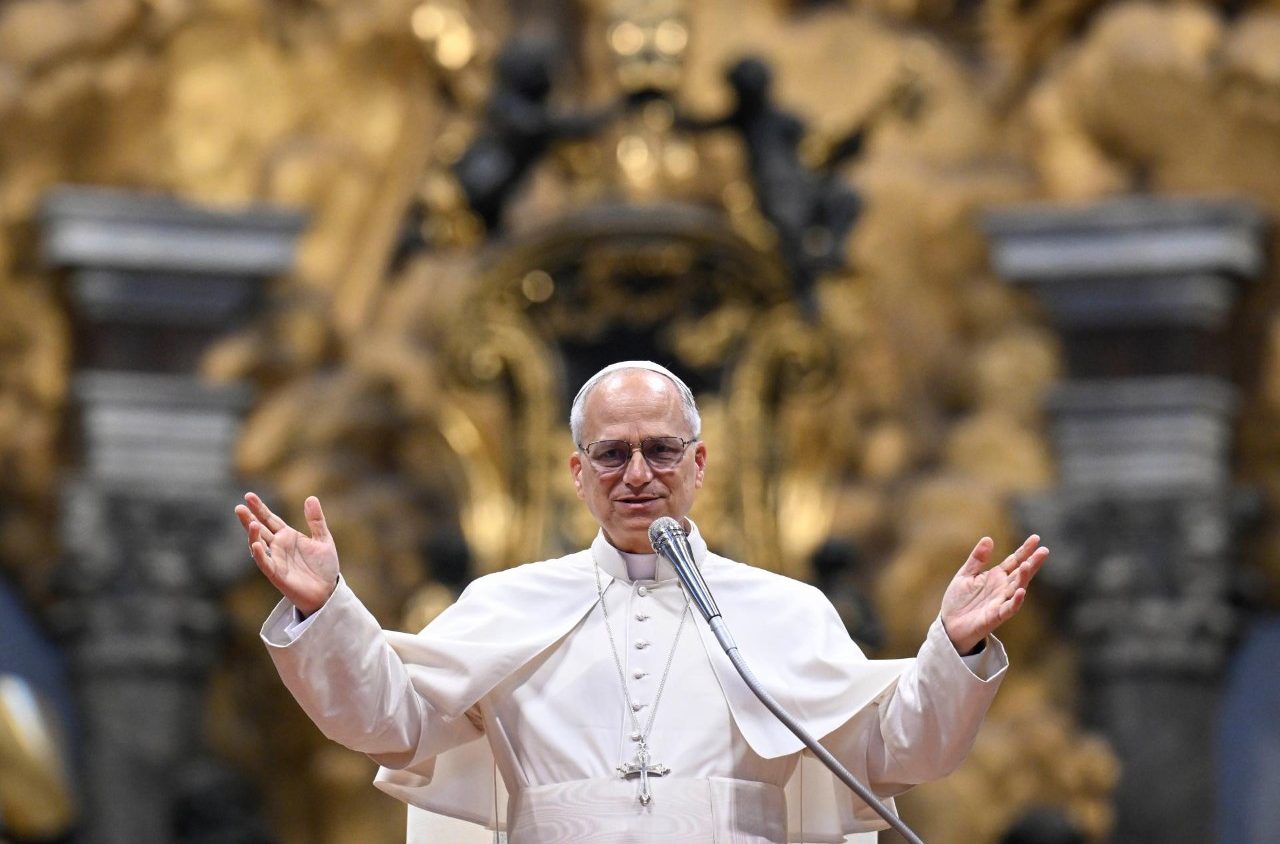Vatican City – “Dearest, have a gentle and humble heart like that of Jesus (cf. Mt 11:29). Following the example of the Apostle Paul (cf. Phil 2:5ff), may you take on the attitudes of Christ, to grow in human maturity, especially in the affective and relational dimensions. It is important, indeed necessary, from the very time of the seminary, to place great emphasis on human formation, rejecting all masking and hypocrisy. Keeping your gaze fixed on Jesus, one must learn to give name and voice even to sadness, fear, anguish, and indignation, bringing everything into the relationship with God. Crises, limits, and fragilities are not to be concealed; rather, they are occasions of grace and Paschal experience.”
This morning, in the majestic setting of St. Peter's Basilica, Pope Leo XIV met with seminarians from all over the world, gathered for the Jubilee. It was a moment of profound spiritual and human significance, where the Pontiff expressed palpable joy and sincere encouragement to the new generation of future priests. Around five thousand young men were present.
“Thank you, thank you all! In the name of the Father, and of the Son, and of the Holy Spirit. Peace be with you!” began the Holy Father, warmly greeting the seminarians and their formators, who welcomed him with a long round of applause. His words stirred in the hearts of all present a sense of hope, responsibility, and missionary zeal.
Leo XIV reminded the youth that today they are not mere pilgrims but living witnesses of a Church that must be "outgoing", open and courageous. He emphasized the priestly vocation as a brave response to a calling in difficult times, inviting the seminarians to be gentle yet strong heralds of the saving Word.
The Pope, departing from his prepared remarks, also addressed the assembly in Spanish, a sign of his attention to the diverse origins of the clerics present: “Gracias por haber aceptado con valentía la invitación del Señor...” At the heart of his speech was an appeal to cultivate friendship with Christ, the foundation of any authentic vocational journey. The Pope recalled the centrality of inner work, prayer, and discernment, strongly referencing the encyclical Dilexit nos and the need for a “seminary as a school of affections” in a world marked by narcissism and conflict. The call to a heart “gentle and humble like Jesus’” marked the conclusion of an intense message that also touched on delicate themes such as the need to acknowledge fragilities, fears, and inner crises as moments of grace and authentic growth.

The crisis of formation
At the end of the meditation, everyone present recited the Creed in Latin, a language that unites rather than divides. An important choice, especially in an international context, where seminarians and religious from all over the world were gathered. Yet, as some observed, not everyone recited in Latin, a clear sign of the ideological influence still present in many seminaries, where formators often represent currents hostile to Latin and the liturgy. Until this approach is radically changed, no genuine reform of priestly formation can be hoped for. A new Pope is not enough; a profound renewal of the episcopate is needed.
The Pope then greeted all the bishops personally but reserved a rather cold greeting for some of them. Among these was the rector of the Pontifical Roman Major Seminary, currently in clear trouble: after years of calls to the Pope and contacts facilitated by his cousin, he now seems unsure which newly-elected relatives to cling to like a limpet. Meanwhile, the priests of Rome do not hide their hope that Di Tolve and Tarantelli soon board the first train heading for some remote place on Earth.
Even to H.E. Msgr. José Rodríguez Carballo, former Secretary of the Dicastery for Consecrated Life, the Pope simply shook his hand, while Carballo kissed his ring—a gesture he had never done in twelve years. But, as we know, hypocrisy is often the most comfortable outfit for some. This morning, Carballo was received in a private audience by the Holy Father, but sources close to the encounter speak of a man visibly uneasy—an ending that was anything but surprising. Robert Francis Prevost has never tolerated the nepotistic and corrupt management of that dicastery under Carballo's leadership. And the Pope, who knew Carballo well during his tenure as General Prior of the Augustinians, listened and welcomed him this morning—but without fake compliments. During the farewell, Carballo was dismissed coldly. He now finds himself exiled in Spain, in the Archdiocese of Mérida-Badajoz.
By contrast, the welcome extended to H.E. Msgr. Jorge Carlos Patrón Wong, the Mexican archbishop, was markedly different. Known for his kindness and dedication, he has often personally supported poor seminarians and worked with passion at the Dicastery for the Clergy. Wong, also a victim of Pope Francis’ emotionalism, was greeted warmly by Leo XIV, a clear sign of recognition for his value and integrity.
The cancer of hypocrisy
Also present were the so-called "bishop-rectors", still burdensome and problematic figures in the governance of some dioceses. Even after leaving the direction of seminaries, they end up ruling dioceses with an authoritarian style marked by rigidity, control, and manipulative dynamics. Often incapable of genuine personal maturity, they project their own fragilities onto others, fostering a climate of suspicion, judgment, and mistrust among the clergy. They promote relationships based more on fear than trust, and even make inappropriate intrusions into the internal forum of priests—forgetting that certain spiritual matters are not the bishop’s business.
One emblematic case is that of Msgr. Antonio Napolioni, known for his persecutions of seminarians he didn’t like during his time in Ancona, and for a management of the Cremona diocese that many today call embarrassing. At his side is Msgr. Trevisi, Bishop of Trieste but originally from Cremona. Both without the proper cassock, Napolioni even with short sleeves. Perhaps someone in Cremona hasn’t realized there’s been a Conclave.
After all, this is the episcopate we have today. Just think of Napolioni: at World Youth Day he was dancing and clowning around in a trimmed cassock and zucchetto, even putting a fisherman's hat on top. Yet in front of the Holy Father, he appears in short sleeves, with a pectoral cross resting comfortably on his belly. Because poverty, as we know, is a value to be flaunted when speaking of liturgy or tradition. But when it comes to emptying the pantry, no expense is spared.

Leo XIV close to his seminarians
While certain media outlets keep repeating that Pope Leo XIV is “cold”—a narrative not even Cardinal Zuppi has countered, failing to utter a single word in his defense at the Repubblica Festival—Prevost proved once again to be a man of warmth, close to priests and seminarians. After greeting the formators and bishops, he approached all the clerics, smiling simply. He took some zucchettos offered by the young men, placed them on his head and returned them with cordiality. He signed postcards, shook hands, even with those who rudely pulled at him.
And the Pope? Always smiling. Even when pulled, he didn’t react with anger or irritation. The embarrassing scene of a Pope losing his patience with an Asian woman in St. Peter’s Square—as happened years ago—did not repeat itself. Another style, another posture. But you can be sure: neither Andrea Tornielli nor Salvatore Cernuzio—both from Pizzo Calabro—will tell you this.
At the end of the meditation, the seminarians left the Basilica visibly joyful. One of them commented: “Finally, we breathe a lighter atmosphere. The Pope’s meditation will remain with us in the days to come. What comforts us most is knowing the Pope loves us, and he said so. He encouraged us instead of scolding us, as happens too often.”
p.M.C.
Silere non possum